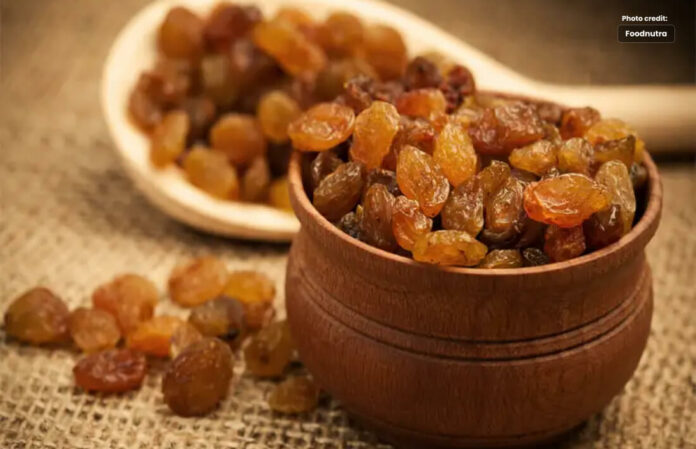Discover potential of raisin as simple and natural remedy for anemia.
Allow me to briefly explain anemia before we delve into the health benefits of raisin. It happens when the body doesn’t have enough hemoglobin, the protein that carries oxygen, or red blood cells.
Weakness, exhaustion, pale skin, and dyspnea are typical symptoms. Since iron deficiency is a major contributor to anemia, including foods high in iron in a balanced diet is essential.
The Raisins’ Iron Content
When considering foods high in iron, raisins—which are made from dried grapes—might not be the first thing that come to mind. These little nibbles are surprisingly high in iron and other vital nutrients, though.
Raisins are an easily accessible and natural way to combat anemia, as one cup of raisins contains a substantial portion of the daily recommended intake of iron.
Nutritional profile
Raisins have a remarkable nutritional profile that goes beyond iron. They are an excellent source of several vitamins and minerals, fiber, and antioxidants. Because of the combination of these components, raisins are not only a delicious snack but may also be a powerful tool for enhancing general health and wellbeing.
How Raisins Increase Absorption of Iron
Raisins have a special benefit even though their non-heme iron—found in plant-based foods—is not as easily absorbed by the body as heme iron, which is found in animal products. Vitamin C, which is also abundant in raisins, is well known for improving the absorption of non-heme iron. The iron and vitamin C found in raisins are a powerful combination that can help raise the body’s iron levels.
Including Raisins in Your Nutrition
Finding tasty and inventive ways to include raisins in your diet is the next step, now that we know of their potential advantages in the fight against anemia. There are many ways to incorporate raisins into your meals on a regular basis, from adding them to trail mixes and salads to adding them to yogurt and breakfast cereals. In this article, we’ll look at some delicious recipes later on.
Additional Nutrients in Raisins That Help Manage Anemia
Raisins have additional nutrients besides iron and vitamin C that help with anemia management. These include B vitamins like B2 (riboflavin), B3 (niacin), and B6 (pyridoxine), which support blood health generally, and copper, which facilitates the absorption of iron. To the fullest extent possible, maximizing the nutritional impact of raisins as a food that fights anemia requires understanding this effect.
Raisin Recipes to Reduce Anemia
Now let’s put the theory into action with some delectable raisin recipes that will raise iron levels and improve dietary intake in general. These recipes, which range from nutrient-dense salads to smoothies that boost energy, are simple to make and fun for the whole family.
Rich Raisin Smoothie with Iron
- Greek yogurt, raisins, bananas, spinach, and a dash of orange juice are the ingredients.
- Combine these ingredients in a blender to make a revitalizing, high-iron smoothie to start your day.
Quinoa Salad with Raisins and Walnuts
- Cooked quinoa, diced cucumbers, cherry tomatoes, raisins, chopped walnuts, and a lemon vinaigrette are the ingredients.
- Combine these ingredients to make a filling and healthy salad that’s great for lunch or dinner.
Conclusion
Although raisins may not be a panacea for anemia, they do, in fact, provide a tasty and convenient way to increase iron levels and promote general health. Including these dried fruits in your diet in addition to other foods high in iron can help you manage your anemia holistically. As usual, seeking individualised advice and guidance from a healthcare professional is crucial when it comes to managing health conditions.
You’re one step closer to supporting your body and fighting anemia in a tasty way with the natural goodness of raisins. Keep in mind that the path to better health can be tasty.
Also read this: What Happens If You Leave Vitamin B12 Deficiency Untreated




